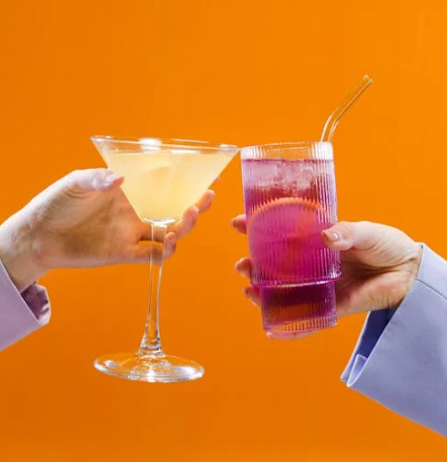Cocktails Vs Mocktails | What’s The Difference?
Cocktails and mocktails are drinks that lots of people like and drink all over the world. Even though they may seem similar, they’re actually quite different. In this post will talk about what makes cocktails and mocktails different and why people enjoy both of them.
What Cocktails Are?
First, let’s learn about cocktails and have a better understanding of the drink itself. To put it simply, cocktails are alcoholic drinks made by mixing different types of alcohol, like vodka, rum, gin, or tequila, with other stuff like fruit juices, syrups, and bitters. The word “cocktail” started in the early 1800s in the United States and now means mixed alcoholic drinks you get at bars and restaurants. Today, cocktails are very popular and loved for many reasons.
First, they taste delicious! Mixing different flavors makes them sweet, fruity, or a bit spicy, so everyone can find one they like. Second, they’re served in fancy glasses and look really nice. This makes them enjoyable to drink and perfect for sharing pictures online. Third, they’re often linked with parties and hanging out with friends, bringing people closer and making moments memorable. Lastly, some people enjoy the alcohol in cocktails because it helps them feel relaxed or happy, making them popular in social settings. Overall, cocktails are popular because they taste great, look cool, and bring joy to gatherings
What Mocktails Are?
On the other side, mocktails are like cocktails, but they don’t have any alcohol in them. The name ‘mocktail’ comes from blending ‘mock’ (which means imitation) and ‘cocktail.’ Mocktails use almost the same ingredients as cocktails, but they skip the alcohol part. That’s why they’re great for people who don’t drink alcohol, like kids, designated drivers, or those who choose not to drink for health or personal reasons.
What’s The Main Difference Between Cocktails And Mocktails?

Here’s another big difference between cocktails and mocktails: alcohol. Cocktails have alcohol in them, but mocktails don’t have any at all. This makes mocktails safer for some people or events where alcohol isn’t wanted. Another thing that sets them apart is the taste. Cocktails have lots of different flavors because they mix alcohol with other stuff like juices and garnishes. They can be sweet, fruity, or even bitter. Mocktails taste good too, but they only use non-alcoholic ingredients, so they have a different flavor, but they’re still yummy.
Something else that makes cocktails and mocktails different is how they look. Cocktails usually come in fancy glasses like martini or highball glasses, sometimes with fruit or herbs on the side. The way cocktails look is part of what makes them special. Mocktails look nice too, but they’re served in similar glasses without those extra decorations. And where you drink them matters too. Cocktails are often enjoyed at places like bars, parties, or fancy events where alcohol is served. They’re linked with fun times, relaxing, and hanging out with friends. Mocktails, though, can be enjoyed in more places, like family get-togethers or business meetings, where people might prefer not to drink alcohol.
And for health, mocktails have some benefits. They’re lower in calories because they don’t have alcohol, and they don’t give you those bad feelings like a hangover or fuzzy thinking. That’s why some people like them—they’re a healthier option
To sum up, cocktails and mocktails give you different drinking experiences, each with its special qualities. Cocktails are alcoholic drinks loved for their many flavors, fancy looks, and connection to parties and fun times. Mocktails, though, are alcohol-free options that still taste great and give you a refreshing drink if you don’t want alcohol. Whether you like the strong taste of a cocktail or the alcohol-free goodness of a mocktail, there’s a drink for everyone and every occasion. Here’s to all the different drinks that bring people together, whether it’s cocktails or mocktails! Cheers!
Images in this article are from Pixabay (not copyrighted and free commercial use)
Share this content:
